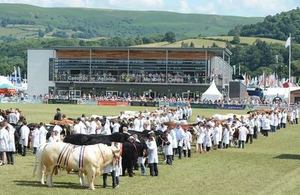PM announces multi-million pound boost for British food industry
Central government will commit to buying fresh, locally sourced and seasonal food to benefit British farmers and small businesses.

Royal Welsh Show
£400 million of potential new business for the British food industry was announced today (21 July) by Prime Minister David Cameron and Environment Secretary Elizabeth Truss, as part of the government’s long-term economic plan to back British businesses.
The Prime Minister, who will today meet farmers and businesses at the Royal Welsh Show, announced that from 2017, all of central government will commit to buying fresh, locally sourced, seasonal food, so that all food that can be bought locally will be bought locally. This will be done through a new, simplified food and drink buying standard, ‘The Plan for Public Procurement’, which was launched today to benefit thousands of British farmers, small businesses, rural economies and the British public.
The public sector in England spends £1.2 billion every year on food and drink. Up to £600 million of that is spent on imported produce, £400 million of which could be sourced from within the UK. The commitment from central government to use this new buying standard means that just over half of the £400 million will be up for grabs by British farmers.
In addition, the wider public sector will be encouraged and supported in using the new framework with the expectation that all schools and hospitals will, in future, serve more locally reared meats and freshly picked fruit and vegetables.
Prime Minister David Cameron said:
Our long-term economic plan is all about backing the do-ers and the hard-workers – and no one does more or works as hard in Wales and the rest of Britain today than our farmers.
By opening up these contracts, we can help them create more jobs, invest in their businesses and make sure people in Wales have a healthier lifestyle. It’s a triple win – and will mean a brighter future for our country.
Secretary of State for Wales Stephen Crabb said:
Today’s announcement by the Prime Minister further strengthens our commitment to our farmers.
As the new Welsh Secretary I’m absolutely clear that providing support to local communities in rural Wales is critical. That’s why this government is backing businesses and hardworking families across Wales by reducing energy costs, lowering job taxes and freezing fuel duty to encourage job creation, boost growth and raise living standards in the Welsh rural economy.
Of course there’s still more to do. But only by sticking to our long term economic plan will we build a more resilient economy across all parts of Wales and the UK.
Environment Secretary Elizabeth Truss said:
This move will mean that food served in canteens across the public sector can be more local, seasonal and tastier.
It will help drive growth in Britain’s first class food and drink industry and benefit the environment through reduced waste, higher take-up of meals and less unappetising food left on plates.
This is a huge boost to British farmers and producers and for students, patients and employees who want to enjoy fantastic food.
Public sector buyers will now judge potential suppliers against five key criteria:
- how food is produced and whether the food was produced locally
- the health and nutritional content of food purchased
- the resource efficiency of producing the food, such as water and energy use and waste production
- how far the food bought meets Government’s socio-economic priorities such as involvement of SMEs
- quality of service and value for money
British farmers are expected to benefit significantly from the plan because British farmers are best placed to meet these tough new standards.
In addition to backing local and sustainable food, the new standards prioritise procurement from smaller producers, thereby helping SMEs gain access to the lucrative public sector market.
To support these small businesses further, Government will also put in place a new buying process from September, centred around an online portal. Companies which register on this portal and meet the requirements of the plan’s scorecard will automatically be alerted when any eligible contracts come up for tender. They will then be able to apply in just a few clicks.
A Plan for Public Procurement
The ‘Plan for Public Procurement’ has been published following Dr Peter Bonfield’s Review into public produce procurement, which was commissioned by Defra last year. The plan has already generated support from across government and the farming and food sector, including the National Farmers Union, the Food and Drink Federation and major catering companies like Compass and Baxter Storey who supply food across the public sector.
Dr Bonfield said:
I want this work to change how every public institution views the food it buys – we have had a great deal of support from schools, hospitals, businesses, caterers, and farmers, all keen to be a part of this exciting new approach.
The appetite for change is there - by creating the right environment and giving organisations the right tools, small businesses will be able to sell nutritious, top quality food to the public sector market. This is the right approach for our health, our environment and also British businesses.
Agri-Tech winners
The announcement comes as 15 agri-tech projects are told they will receive a share of £18 million of funding from government and industry to help accelerate agricultural innovation and their commercial viability.
This funding will help to support the growth of agricultural science and technology sectors in the UK, which already employs nearly 4 million people and is one of the world’s fastest-growing markets.
The 15 projects will receive £12.1 million funding from government with £5.7 million co-investment from industry. They are all led by UK companies and span 3 key areas of the agriculture sector – crops, livestock and aquaculture.
Further information
Updates to this page
Published 21 July 2014Last updated 21 July 2014 + show all updates
-
Added links to Report and other published documents.
-
First published.